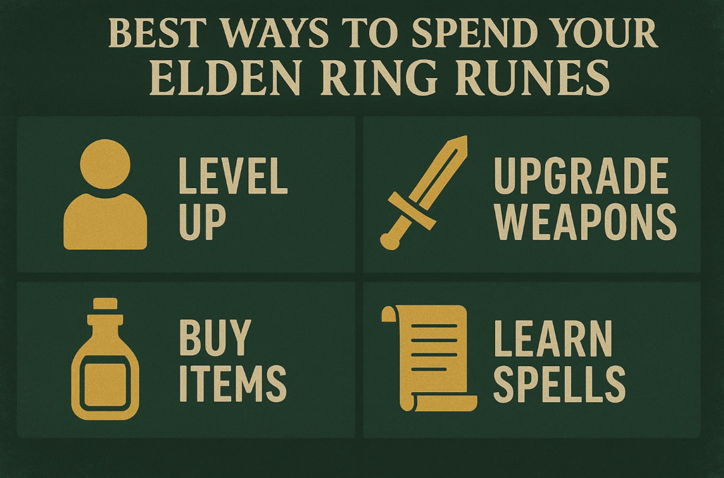
As you traverse the perilous Lands Between in Elden Ring, runes become your lifeline. Dropped by defeated enemies, bosses, and found in hidden corners of the world, these golden fragments serve dual purposes: as experience points for leveling up and as currency for purchasing items. With countless ways to spend your hard-earned runes, making informed choices is key to thriving in this unforgiving world. Below, I share the 10 best ways to spend your runes wisely, drawing from my own journeys as a Tarnished to help you optimize your gameplay, whether you’re a newcomer or a seasoned adventurer.
1. Leveling Up Your Character
Leveling up is the cornerstone of character progression in Elden Ring. By spending Elden Ring Runes at Sites of Grace (after meeting Melina early in the game), you can boost your character’s stats, such as Vigor for health, Endurance for stamina, or attributes like Strength, Dexterity, Intelligence, Faith, or Arcane that align with your build. For melee-focused players, prioritizing Vigor and Strength or Dexterity ensures you can take hits and deal damage. Mages should invest in Intelligence or Faith to unlock powerful spells. Early on, aim for 20-30 Vigor to survive tougher encounters, then focus on your primary damage stat. This approach builds a strong foundation for exploration and boss fights.
2. Upgrading Your Weapons
Your weapons are your primary tools for survival, and upgrading them significantly boosts your combat effectiveness. Visit blacksmiths like Iji in Liurnia or the Twin Maiden Husks at the Roundtable Hold to enhance your weapons using smithing stones, which can be found in the world or purchased from merchants like the Nomadic Merchant in Limgrave. Upgrading your main weapon increases its damage output and can unlock new affinities or abilities, making it more versatile. For example, a +10 weapon early in the game can carry you through mid-game challenges. Prioritize standard or somber smithing stones based on your weapon type to stay ahead of the curve.
3. Purchasing Armor
While armor in Elden Ring isn’t as transformative as weapon upgrades, it can still provide meaningful benefits. Armor sets offer varying levels of poise (resistance to being staggered), defense against physical or elemental damage, and, of course, style. Merchants like the Nomadic Merchant near Saintsbridge in Limgrave sell armor pieces that can improve your survivability. Early on, lightweight armor like the Knight set balances mobility and defense. Later, heavier sets like the Banished Knight armor can be worth the runes if your Endurance supports the weight. Choose armor that complements your playstyle and resistances needed for specific areas, such as fire-resistant gear for Mt. Gelmir.
4. Stocking Up on Consumables
Consumables are essential for surviving Elden Ring’s brutal encounters. Healing flasks, arrows, bolts, crafting materials, and utility items like grease or throwing knives can be purchased from merchants across the Lands Between. For example, Merchant Kalé at the Church of Elleh sells arrows and crafting materials, while Nomadic Merchants often stock healing items. Ranged weapon users should always have a surplus of arrows or bolts, and melee players benefit from crafting greases to add elemental damage. Before tackling dungeons or bosses, ensure your inventory is well-stocked to avoid running out mid-fight.
5. Acquiring Spells and Incantations
For players leaning into magic or hybrid builds, investing runes in spells and incantations opens up new combat strategies. Sorcerers can purchase sorceries from NPCs like Sorceress Sellen in Limgrave’s Waypoint Ruins, while faith-based characters can buy incantations from Brother Corhyn at the Roundtable Hold. Spells like Glintstone Pebble or incantations like Flame, Grant Me Strength provide cost-effective damage or buffs. These purchases not only diversify your arsenal but also make certain encounters—like fighting dragons or large groups—more manageable. Check your stats to ensure you meet the requirements before buying.
6. Buying Talismans
Talismans are powerful accessories that grant passive bonuses, such as increased damage negation, faster spell casting, or boosted critical hit damage. While many talismans are found through exploration, some can be purchased from merchants. For instance, the Golden Scarab talisman, which increases rune acquisition, is available from specific vendors in Caelid. Other talismans, like those boosting stamina regeneration, can be bought from Nomadic Merchants. These items can significantly enhance your build, so consider spending runes on talismans that align with your playstyle, whether you’re a tank, caster, or agile fighter.
7. Saving for Larval Tears
Larval Tears are rare items that allow you to respec your character through the Rebirth option, offered by Finger Reader Enia at the Roundtable Hold after progressing through Ranni’s questline. Respeccing lets you reallocate your attribute points, making it ideal if you want to try a new build or optimize your stats for a specific weapon or spell. Larval Tears can be purchased from merchants like the Nomadic Merchant in Siofra River or found in the world. Saving runes to buy these items ensures you have the flexibility to adapt your character later, especially if you discover a game-changing weapon that requires different stats.
8. Purchasing Unique Items from Merchants
Some merchants sell unique items that can’t be found elsewhere, making them high-priority purchases. Merchant Kalé at the Church of Elleh, for example, sells the Crafting Kit for 300 runes, which unlocks the ability to craft consumables like arrows or greases. He also offers the Telescope, useful for scouting dangerous areas. Other merchants, like the Isolated Merchant in Weeping Peninsula, sell rare weapons or key items that aid progression. Early on, prioritize the Crafting Kit to expand your inventory options, and keep an eye out for unique items that suit your build or exploration needs.
9. Obtaining Bell Bearings
For players willing to take a darker path, killing certain merchants grants their Bell Bearings, which can be given to the Twin Maiden Husks at the Roundtable Hold. This unlocks the deceased merchant’s inventory at a central location, making it easier to restock items like smithing stones or consumables. For example, killing the Nomadic Merchant in Limgrave yields a Bell Bearing that provides access to his stock. While this approach is permanent and may conflict with your moral compass, it’s a strategic way to consolidate your shopping needs. Weigh the consequences before acting, as you’ll lose direct access to that merchant.
10. Saving for Endgame Purchases
As you progress through Elden Ring, more powerful items and services become available. Merchants like the Twin Maiden Husks offer advanced upgrade materials, such as Somber Smithing Stones, or rare spells in the late game. Saving a portion of your runes ensures you can afford these high-cost items when they become available. For example, upgrading a special weapon to +10 or buying a legendary talisman can give you an edge in the final areas. By reserving runes, you’ll be prepared for the game’s toughest challenges, from the Haligtree to the Elden Beast.
Spending runes wisely in Elden Ring is about balancing immediate needs with long-term goals. Early in the game, focus on leveling up, upgrading weapons, and stocking up on consumables to survive Limgrave and beyond. As you progress, invest in spells, talismans, and unique items to refine your build. Don’t overlook the value of saving runes for Larval Tears or endgame purchases, as these can provide flexibility and power when facing the Lands Between’s greatest threats. Every rune spent thoughtfully brings you closer to becoming the Elden Lord.



